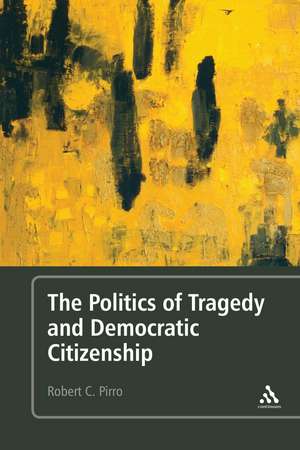The Politics of Tragedy and Democratic Citizenship
Autor Professor Robert C. Pirroen Limba Engleză Paperback – iun 2011
| Toate formatele și edițiile | Preț | Express |
|---|---|---|
| Paperback (1) | 238.01 lei 6-8 săpt. | |
| Bloomsbury Publishing – iun 2011 | 238.01 lei 6-8 săpt. | |
| Hardback (1) | 832.17 lei 6-8 săpt. | |
| Bloomsbury Publishing – iun 2011 | 832.17 lei 6-8 săpt. |
Preț: 238.01 lei
Preț vechi: 272.93 lei
-13% Nou
Puncte Express: 357
Preț estimativ în valută:
45.54€ • 47.44$ • 37.97£
45.54€ • 47.44$ • 37.97£
Carte tipărită la comandă
Livrare economică 29 martie-12 aprilie
Preluare comenzi: 021 569.72.76
Specificații
ISBN-13: 9781441165251
ISBN-10: 1441165258
Pagini: 256
Dimensiuni: 152 x 226 x 20 mm
Greutate: 0.38 kg
Editura: Bloomsbury Publishing
Colecția Continuum
Locul publicării:New York, United States
ISBN-10: 1441165258
Pagini: 256
Dimensiuni: 152 x 226 x 20 mm
Greutate: 0.38 kg
Editura: Bloomsbury Publishing
Colecția Continuum
Locul publicării:New York, United States
Caracteristici
Tragedy is a hot topic across the disciplines from political science to philosophy and literature.
Notă biografică
Robert C. Pirro is Professor of Political Science at Georgia Southern University, USA. His research focuses on the political significance of works and theories of tragedy and ordinary language uses of "tragedy" and related terms. His publications include peer-reviewed articles in Political Theory as well as Hannah Arendt and the Politics of Tragedy (2001).
Cuprins
The Politics of Tragedy: An Introduction and OverviewSECTION I: TRAGEDY AND POLITICAL AGENCY2. Václav Havel: The Political Uses of Tragedy in the Aftermath of Communism3. Italian Neorealism: Tragic Cinema in the Aftermath of Fascism4. Cornel West: Tragedy and the Fulfillment of American DemocracySECTION II: TRAGEDY AND POLITICAL SOLIDARITY5. Nelson Mandela: Tragedy in a Divided South Africa6. 9/11: Tragedy and Theodicy as American Responses to SufferingSECTION III: TRAGEDY AND POLITICAL IDENTITY7. Botho Strauss: Goatsong in a Democratic Key?8. Christa Wolf: Greek Tragedy and German Democracy9. Michael Schorr's Schultze Gets the Blues: German Borrowings from the New World African Tragic 10. Conclusion: Anticipating a Different Kind of Sixties Tragedy
Recenzii
Tragedies are works of art that issue a call to reflection upon our natures and the ways our blindness to ourselves can bring catastrophe into the world. But these works are also driven by the hope that such reflections can help "tame the savageness of man and make gentle the life of the world." Robert Pirro has shown how compelling this call and this hope remain in our times. Tracing a variety of evocations of tragedies - by politicians, playwrights, and theorists, from Robert Kennedy up to the events of 9/11 - Pirro's reminds us that the insights of tragedy remain alive for the aims of a democratic citizenry today. --Dennis J. Schmidt, Liberal Arts Professor of Philosophy, Comparative Literature, and German, The Pennsylvania State University
His earlier study of Hannah Arendt having established him as a consummate political thinker of tragedy, Robert Pirro expands his net with this path-breaking work to include an extensive body of intellectual and cultural phenomena complicit with a tragic understanding of reality. Pirro breaks with the commonplace misconception that America lacks its tragic moment by astutely tracing the tragic perspectives of such prominent Americans as Robert Kennedy and Cornell West, adds the powerful moral voices of Nelson Mandela and Václav Havel, and effectively brings in a variety of German authors and filmmakers from Italian neorealism to the German director Michael Schorr. Adding a critically important strand to political theorizing today, Robert Pirro thus brilliantly succeeds in contemporizing the ancient Athenians' commitment to both tragedy and democracy. - Josef Chytry, University of California, Berkeley &, California College of the Arts.
[this book] is a scholarly scrutiny of tragedy in democracy... [and] would do well in any political science of philosophy collection, enthusiastically recommended.
In his chapter on the work of Cornel West, Pirro does for West what he did earlier for Hannah Arendt in Hannah Arendt and the Politics of Tragedy: He reads scattered references to tragedy in such a persistent and concentrated way that a compelling case emerges for the fundamental importance of that concept to the thinker under examination. Pirro argues that West has over the course of his career been giving shape to a tragic Christianity, a tragic pragmatism, a tragic Marxism, and more. The chapter is a tour de force[.] There are several other standout moments in this book, more than I can list here. One is the book's opening, an incredibly moving portrait of Bobby Kennedy's quest for a way to survive his brother's assassination, ultimately finding sustenance in the 5th century tragedians introduced to him by way of Edith Hamilton, their popularizer in the 1960's.
His earlier study of Hannah Arendt having established him as a consummate political thinker of tragedy, Robert Pirro expands his net with this path-breaking work to include an extensive body of intellectual and cultural phenomena complicit with a tragic understanding of reality. Pirro breaks with the commonplace misconception that America lacks its tragic moment by astutely tracing the tragic perspectives of such prominent Americans as Robert Kennedy and Cornell West, adds the powerful moral voices of Nelson Mandela and Václav Havel, and effectively brings in a variety of German authors and filmmakers from Italian neorealism to the German director Michael Schorr. Adding a critically important strand to political theorizing today, Robert Pirro thus brilliantly succeeds in contemporizing the ancient Athenians' commitment to both tragedy and democracy. - Josef Chytry, University of California, Berkeley &, California College of the Arts.
[this book] is a scholarly scrutiny of tragedy in democracy... [and] would do well in any political science of philosophy collection, enthusiastically recommended.
In his chapter on the work of Cornel West, Pirro does for West what he did earlier for Hannah Arendt in Hannah Arendt and the Politics of Tragedy: He reads scattered references to tragedy in such a persistent and concentrated way that a compelling case emerges for the fundamental importance of that concept to the thinker under examination. Pirro argues that West has over the course of his career been giving shape to a tragic Christianity, a tragic pragmatism, a tragic Marxism, and more. The chapter is a tour de force[.] There are several other standout moments in this book, more than I can list here. One is the book's opening, an incredibly moving portrait of Bobby Kennedy's quest for a way to survive his brother's assassination, ultimately finding sustenance in the 5th century tragedians introduced to him by way of Edith Hamilton, their popularizer in the 1960's.






